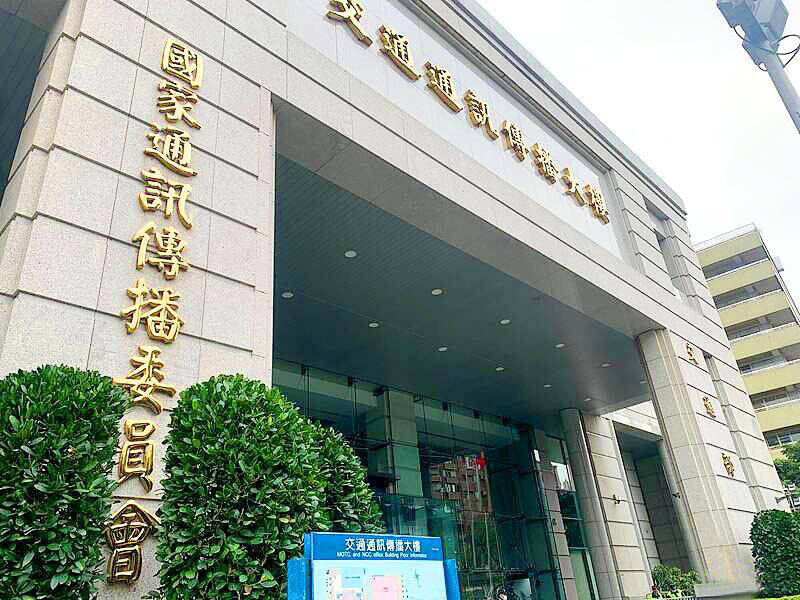Taiwan Mobile has been fined NT$300,000 (US$9,136) as a default surcharge for failing to dispose of the excess bandwidth in frequency bands below 1 gigahertz (GHz) before the deadline designated by the National Communications Commission (NCC), as well as an additional NT$3 million fine for contravening the Telecommunications Act.
Taiwan Mobile has since returned the frequency as ordered.
The commission first issued the ruling on the default charge on July 10 after listening to a statement by Taiwan Mobile chief technology officer C.H. Jih (揭朝華).

Photo: Ting Yi, Taipei Times
The nation’s second-largest telecom was told to rectify the situation within three days after it received the official ruling, or it would face a fine of NT$3 million for failing to follow its business plan.
As the telecom did not rectify the situation as ordered, it was fined NT$3 million by the commission on July 17.
The nation’s three large telecoms are permitted to have no more than 50 megahertz (MHz) in frequency bands below 1GHz, which can produce radio waves that have higher penetration and diffraction capabilities, and enable telecoms to broaden the service coverage of 5G systems.
Taiwan Mobile obtained 60MHz in highly sought-after frequency bands following its merger with Taiwan Star Telecom, which the commission approved last year on the condition that by June 30, Taiwan Mobile must return the excess bandwidth of 10MHz to the government, or sell or transfer it to other telecoms.
In his statement, Jih said the company is still using the excess bandwidth to serve customers, but that it is scheduled to consolidate the base stations of Taiwan Mobile and Taiwan Star by the end of November and return the excess bandwidth to the Ministry of Digital Affairs by the end of December.
Taiwan Mobile said in a separate statement that it has been working ahead of its schedule since Dec. 1 last year.
“However, the time that we had to consolidate the network was too short, and the court has yet to rule over the administrative lawsuit that we filed challenging the conditions of the merger,” the company said. “To ensure the quality of services offered to users and protect shareholders’ interests, we have found it difficult to return the excess bandwidth before the end of June.”
NCC commissioners disagreed with Taiwan Mobile’s explanation, saying it has other ways to protect its users.
“There are multiple ways for the company to consolidate the networks. Why does it have to choose the one that is difficult to complete within a short period of time?” NCC Chief Secretary Huang Wen-che (黃文哲) said on behalf of the commissioners.

The Mainland Affairs Council (MAC) today condemned the Chinese Communist Party (CCP) after the Czech officials confirmed that Chinese agents had surveilled Vice President Hsiao Bi-khim (蕭美琴) during her visit to Prague in March last year. Czech Military Intelligence director Petr Bartovsky yesterday said that Chinese operatives had attempted to create the conditions to carry out a demonstrative incident involving Hsiao, going as far as to plan a collision with her car. Hsiao was vice president-elect at the time. The MAC said that it has requested an explanation and demanded a public apology from Beijing. The CCP has repeatedly ignored the desires

Many Chinese spouses required to submit proof of having renounced their Chinese household registration have either completed the process or provided affidavits ahead of the June 30 deadline, the Mainland Affairs Council (MAC) said on Thursday. Of the 12,146 people required to submit the proof, 5,534 had done so as of Wednesday, MAC deputy head and spokesperson Liang Wen-chieh (梁文傑) said. Another 2,572 people who met conditions for exemption or deferral from submitting proof of deregistration — such as those with serious illnesses or injuries — have submitted affidavits instead, he said. “As long as individuals are willing to cooperate with the legal

The Ma-anshan Nuclear Power Plant’s license has expired and it cannot simply be restarted, the Executive Yuan said today, ahead of national debates on the nuclear power referendum. The No. 2 reactor at the Ma-anshan Nuclear Power Plant in Pingtung County was disconnected from the nation’s power grid and completely shut down on May 17, the day its license expired. The government would prioritize people’s safety and conduct necessary evaluations and checks if there is a need to extend the service life of the reactor, Executive Yuan spokeswoman Michelle Lee (李慧芝) told a news conference. Lee said that the referendum would read: “Do

Taiwan's Vice President Hsiao Bi-khim (蕭美琴) said Saturday that she would not be intimidated by the Chinese Communist Party (CCP), following reports that Chinese agents planned to ram her car during a visit to the Czech Republic last year. "I had a great visit to Prague & thank the Czech authorities for their hospitality & ensuring my safety," Hsiao said on social media platform X. "The CCP's unlawful activities will NOT intimidate me from voicing Taiwan's interests in the international community," she wrote. Hsiao visited the Czech Republic on March 18 last year as vice president-elect and met with Czech Senate leadership, including